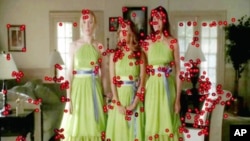A Tel Aviv University engineer has developed a tool to put the brakes on video crime.
Illegal DVD sales and movie downloads cost the U.S. economy as much as $20 billion a year in lost business, jobs, wages and taxes. With more than 16 million downloads, the sci-fi thriller "Avatar" was the most pirated movie of 2010. It was also the top box-office hit of the year.
Alex Bronstein, who collaborated with a team of researchers at Tel Aviv University, says video-matching could help track pirates. The technique mimics the technology used to map the human genome - to detect pirated video clips.
"The idea is to represent videos as sequences of some letters over a visual alphabet, and find common subsequences in different genetic sequences," says Bronstein.
The way it works is that an invisible grid would be applied over the produced film or video turning the footage into a series of numbers or its unique "genetic code." Once a film has been sequenced, producers and copyright holders can scan the Internet for suspected illegal downloads. Bronstein says the technique is effective even when features like color and resolution have been altered, commercials added or scenes edited out.
"For example, you can record your video with a camcorder from a cinema screen and still the resulting genetic code of the recorded sequence will be very similar to what original video contained."
Inspecting large databases for illegal videos produced in multiple formats is time consuming and labor intensive. Bronstein says video-matching can automate the process with greater accuracy. "We do it a much finer grain, in a much more robust way."
That means illegal sites can be more quickly identified and shut down. Bronstein says his team has begun to commercialize the technology with a video indexing service. "You can upload your video clip, ask this service to index it and compute the video genome out of it. And, then once you have it, any other video you send to this service can be identified as one of the videos already existing in the database."
Avatar was produced in 3-D, which filmmaker James Cameron had argued would make the movie pirate-proof. Alex Bronstein says video-matching is more likely to ensure that Cameron's next blockbuster will not top the list of most pirated films.




